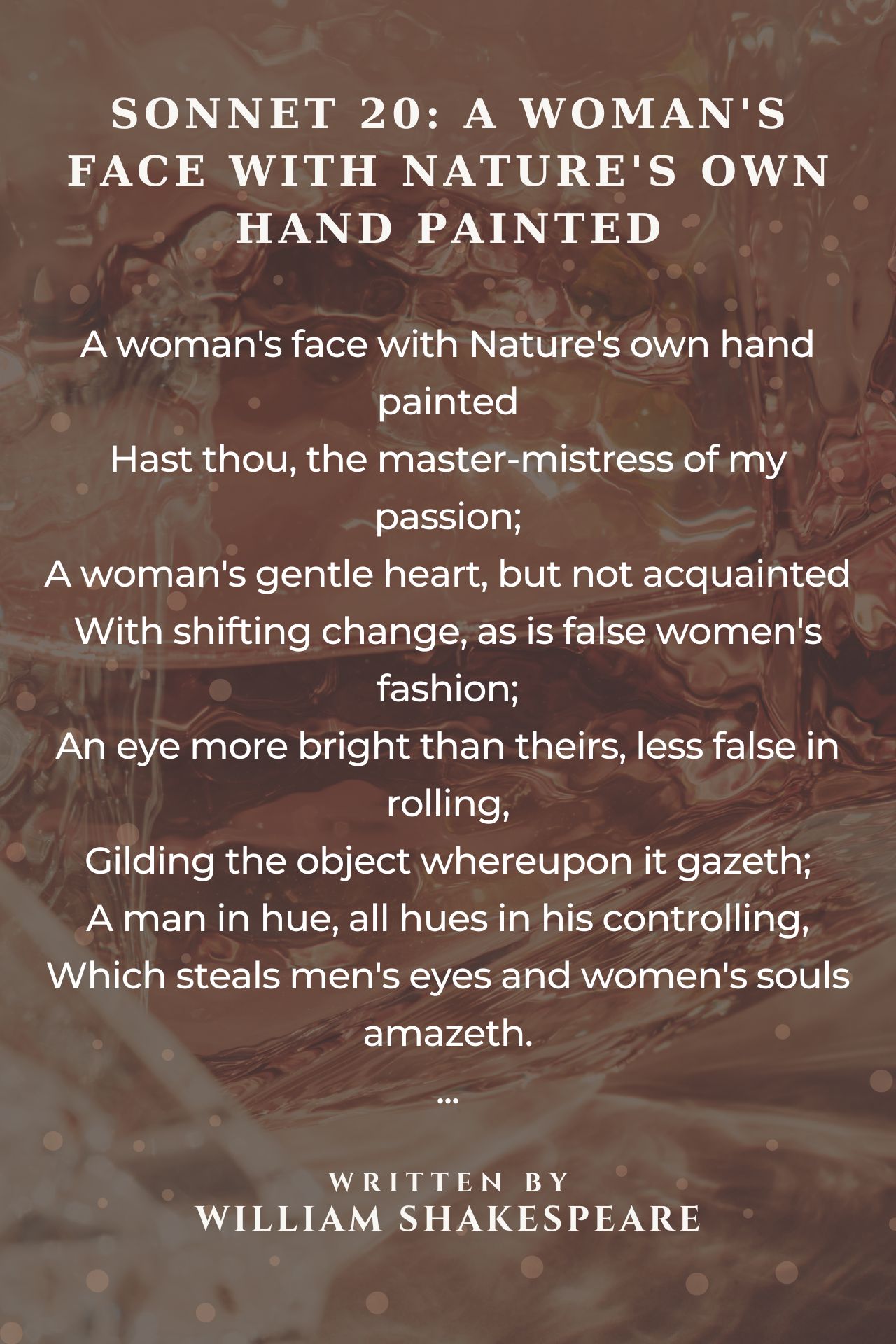Sonnet 20: A Woman's Face With Nature's Own Hand Painted Poem by William Shakespeare
Sonnet 20: A Woman's Face With Nature's Own Hand Painted
A woman's face with Nature's own hand painted
Hast thou, the master-mistress of my passion;
A woman's gentle heart, but not acquainted
With shifting change, as is false women's fashion;
An eye more bright than theirs, less false in rolling,
Gilding the object whereupon it gazeth;
A man in hue, all hues in his controlling,
Which steals men's eyes and women's souls amazeth.
And for a woman wert thou first created,
Till Nature, as she wrought thee, fell a-doting,
And by addition me of thee defeated,
By adding one thing to my purpose nothing.
But since she pricked thee out for women's pleasure,
Mine be thy love and thy love's use their treasure.

This sonnet has much of interest for those seeking to delve to the root the nature of Shakespeare's passion. Many have thought that it contains clues, anagrams and acrostics of the young man's name. As KDJ points out, its placing here, as sonnet 20, probably relates to the primitive associations of the number with human anatomy, each human having 20 digits (fingers and toes) in all. Clearly this might be one of the key sonnets which could unlock the secrets of Shakespeare's heart. At some stage any reader has to come to terms with the implicit sexuality contained in it, for it is an open declaration of love by one man for another man, something which few ages in the history of the world have been able to view with complete equanimity. But we should not exaggerate the importance of this one humorous exercise of wit so as to make it into a credo of the whole sonnet sequence. Declarations of love abound in what follows, and this sonnet is not exceptional in that respect. In fact it has more appeal as a display of ingenuity than as a deeply committed betrothal scene. Although it does undoubtedly underline some of the contradictions that arise when one man loves another, Christian charity demands that we do not overstress this, for love is love in whatever sphere it moves, and the love which Shakespeare describes in 1-126 seems to be infinitely more altruistic and self-giving than that of the poisonous love of the dark lady sonnets which conclude the sequence. shakespeares-sonnets.com/sonnet
.. 'You were created by Nature as a woman but more beautiful than any woman, for you do not have their faults. But Nature changed her mind as she made you, and turned you into a man, for she herself adored you, and, perhaps desiring congress, gave you male parts. Therefore I cannot love you with the fulness that I would love a woman. But let me have your real love, while women enjoy the physical manifestation of it, which I know to be merely a superficies'.
One other point of interest regarding this sonnet: the metre. Shakespeare wrote his sonnet sequence in iambic pentameter. This poem however has strict hendecasyllabic (eleven syllable) lines. Each line has an extra unstressed half-foot on the end of it. In poetry this is known as a 'feminine' or 'soft' ending. Shakespeare was basically having a joke - he wrote feminine lines to a young man, it's a metrical pun. He also alludes to this in line 12 through a clever double meaning regarding 'by adding one thing'. Anyway hope you guys find that interesting, it's one of the reasons I love this sonnet!
This poem has not been translated into any other language yet.
I would like to translate this poem
If anyone wondered whether Shakespeare was gay or bisexual, this should remove any doubt...